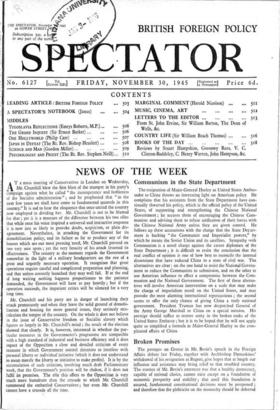Communism in the State Department
The resignation of Major-General Hurley as United States Ambas- sador to China throws an interesting light on American policy. He complains that his assistants from the State Department have con- tinually thwarted his policy, which is the official policy of the United States, of supporting and strengthening the Chinese National Government ; he accuses them of encouraging the Chinese Com- munists and advising them to refuse unification of their forces with the Chinese National Army unless they are given control. He follows up these accusations with the charge that the State Der art- ment is backing "the Communist and Imperialist powers," by which he means the Soviet Union and its satellites. Sympathy with Communism is a novel charge against the career diplomats of the State Department ; it is difficult to resist the conclusion that the real conflict of opinion is one of how best to reconcile the internal dissensions that have reduced China to a state of civil war. The alternatives are clear: on the one hand to assist the National Govern- ment to reduce the Communists to submission, and on the other to use American influence to effect a compromise between the Com- munists and the National Government. The first of these alterna- tives will involve American intervention on a scale that may make the charge of imperialism recoil on the United States, and may provoke the most alarming international repercussions ; the second seems to offer the only chance of giving China a truly national government. President Truman has now despatched General of the Army George Marshall to China on a special mission. His prestige should suffice to restore unity in the broken ranks of the United States Embassy ; but it is to be hoped that he will not apply quite so simplified a formula as Major-General Hurley to the com- plicated affairs of China.






























